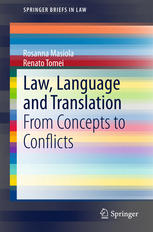

Most ebook files are in PDF format, so you can easily read them using various software such as Foxit Reader or directly on the Google Chrome browser.
Some ebook files are released by publishers in other formats such as .awz, .mobi, .epub, .fb2, etc. You may need to install specific software to read these formats on mobile/PC, such as Calibre.
Please read the tutorial at this link: https://ebookbell.com/faq
We offer FREE conversion to the popular formats you request; however, this may take some time. Therefore, right after payment, please email us, and we will try to provide the service as quickly as possible.
For some exceptional file formats or broken links (if any), please refrain from opening any disputes. Instead, email us first, and we will try to assist within a maximum of 6 hours.
EbookBell Team

4.0
46 reviewsThis book is a survey of how law, language and translation overlap with concepts, crimes and conflicts. It is a transdisciplinary survey exploring the dynamics of colonialism and the globalization of crime. Concepts and conflicts are used here to mean ‘conflicting interpretations’ engendering real conflicts. Beginning with theoretical issues and hermeneutics in chapter 2, the study moves on to definitions and applications in chapter 3, introducing cattle stealing as a comparative theme and global case study in chapter 4. Cattle stealing is also known in English as ‘rustling, duffing, raiding, stock theft, lifting and predatorial larceny.’ Crime and punishment are differently perceived depending on cultures and legal systems: ‘Captain Starlight’ was a legendary ‘duffer’; in India ‘lifting’ a sacred cow is a sacrilegious act. Following the globalization of crime, chapter 5 deals with human rights, ethnic cleansing and genocide. International treaties in translation set the scene for two world wars. Introducing ‘unequal treaties’ (e.g. Hong Kong), chapter 6 highlights disasters caused by treaties in translation. Cases feature American Indians (the ‘trail of broken treaties’), Maoris (Treaty of Waitangi) and East Africa (Treaty of Wuchale).